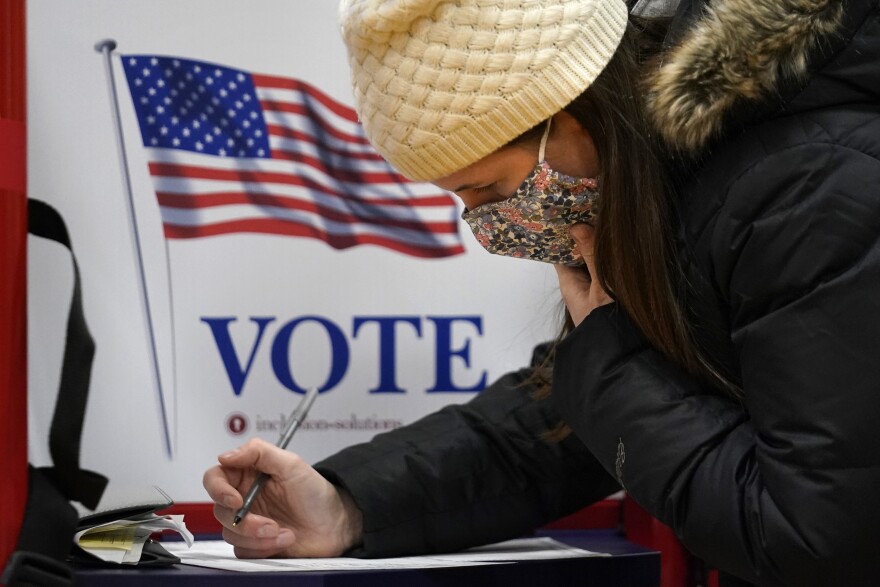Loading...
The elections coming up on Nov. 2 might not garner nearly as much national attention as the 2020 election, in which Joe Biden ascended to the presidency and a new crop of Maine legislators was chosen.
But it’s still a big year for Maine voters, who will help decide the fate of the controversial power line through the Upper Kennebec region, consider an unrelated change in the state constitution, and weigh in on many other local races and referendums.
To help guide voters in the week leading up to Election Day, we’ve answered some questions below — and included links to additional Maine Public coverage of the issues.
Click a question to navigate to more information below:
- What’s on the statewide ballot?
- What’s on my local ballot?
- When and where do I vote?
- Can I request an absentee ballot?
- Can I vote early in person?
- Can I track my absentee ballot?
- How do I register to vote? Is it too late?
- Who can register to vote?
- What can I do to help?
What’s on the statewide ballot?
Question 1 asks voters a set of questions having to do with the highly controversial 50-mile corridor Central Maine Power is building to carry hydropower from Quebec to Massachusetts.
Voting yes would halt construction of the new corridor in the Upper Kennebec region. It would also give the Legislature final say in any similar transmission projects and require a supermajority of the Legislature to approve any transmission project using public lands going back to 2014.

However, if the referendum passes, the outcome would likely face legal challenges from backers of the project.
The CMP corridor has been one of the most polarizing issues in recent Maine history. Supporters and opponents of Question 1 have so far dumped a record-breaking $60 million on political ads -- some of them quite misleading — about the proposal.
Supporters of Question 1 include grassroots activists concerned about the loss of forested land for hunting, fishing, recreation and conservation, as well as competing electricity providers who have bankrolled a significant chunk of the campaign. Some opponents of the CMP corridor question whether the hydropower it carries would meaningfully reduce greenhouse gas emissions, in part because the new infrastructure could at times be used to carry energy from non-renewable sources.
Opponents of Question 1 include CMP, its parent company Avangrid and the government-owned utility Hydro-Quebec. Gov. Janet Mills also supports the building of the corridor. In Maine, the project has support from some environmental groups that argue it would help reduce greenhouse emissions -- by bringing excess hydropower into New England and raising additional funds for clean energy investments in the state. Some groups also tout the economic development from such a large infrastructure project.
However, given the scale and complexity of the regional electric system, and competing claims about the efficacy of dams, it has been hard to judge whether the project would bring about a net decrease in greenhouse gas emissions.
For more on Question 1, read this explainer by Maine Public politics reporters Steve Mistler and Kevin Miller.
Question 2 would allow the state to issue a $100 million bond for future infrastructure projects, including construction and improvement of roads, bridges, airports, transit facilities and ports.
Voting yes would authorize the state to borrow the funds, which would unlock an additional $253 million in federal and other funds.
A study issued in 2015 by Jim Melcher, professor of political science at the University of Maine Farmington, found that bond issues here usually pass. And in the time since the study was conducted, no bond issue has failed at the polls.
Question 3 asks an open-ended question: whether Maine’s constitution should be amended to state that all people “have a natural, inherent and unalienable right” to grow, produce and consume their own food for purposes of “nourishment, sustenance, bodily health and well-being.”
Supporters of the “right-to-food” referendum hope that change will provide a legal foundation for small-scale food producers to raise and sell their own vegetables, livestock and other provisions.
Its backers helped push Maine in 2017 to become the first state in the nation with a “food sovereignty” law, which allows communities to authorize local food producers to directly sell products such as raw milk to customers on their premises.
But opponents of Question 3 say that the proposed amendment is overly vague and could make it harder for Maine communities to enforce food safety and animal welfare rules.
It’s unlikely the amendment would have any immediate consequences. Rather, it would more likely become a factor in a legal action against Maine food producers, and it could help guide the passage of future regulations in the Legislature and in individual communities.
For more information, listen to this report by Maine Public's Jennifer Mitchell or this Maine Calling episode on Question 3.
Here is a sample ballot with the three referendum questions:
What’s on my local ballot?
Communities around Maine will hold elections for local office, including city councils, select boards, and school committees. Local referendums will also appear on the ballots in some towns and cities.
For more information on the specific items on your local ballot, you can visit the website or call the office of your town or city.
There are some other items appearing on the statewide ballot, but only for voters in a few Maine communities:
- In Franklin County, voters will be asked two questions: whether the county treasurer should be appointed by county commissioners rather than elected, and whether the number of commissioner districts should be expanded from 3 to 5.
- In House District 86, which covers part of Augusta, voters will be asked to choose one of two candidates in a special election to fill the seat vacated by former Rep. Justin Fecteau, a Republican. The candidates are Democrat Raegen French LaRochelle and Republican James E. Orr.
When and where do I vote?
Election Day is Tuesday, Nov. 2, 2021. The state of Maine maintains a tool to look up your polling place online here. All voting places close at 8 p.m. on Election Day.
Can I request an absentee ballot?
Any registered voter can cast an absentee ballot in Maine — you don’t need a specific reason. You can request an absentee ballotonline here, which will be mailed to your address. You can request an absentee ballot until the close of business on Thursday, Oct. 28, 2021, unless there are special circumstances. Municipalities across the state have secure ballot drop boxes that Mainers can use to drop off their absentee ballots. You can also mail your absentee ballot, though officials warn of delays in the U.S. Postal Service and encourage mailing ballots as soon as possible. Ballots must be received by 8 p.m. on Election Day.
Can I vote early in person?
Yes, you can go to your local municipal office during business hours and vote in person early.
Can I track my absentee ballot?
Yes, you can track the status of your absentee ballot here.
How do I register to vote? Is it too late?
You can still register to vote for the Nov. 2 election in Maine – it is not too late! In Maine, you can both register to vote and cast a ballot in person on Election Day. And you can still register before Election Day at your town office or city hall. You can register by mail 21 days before Election Day, but that deadline has now passed. To register to vote, you must complete this form and provide documents that show proof of identity and proof of residency. A state driver’s license or identification card meets both criteria, and the state website has a list of other acceptable documents. And as of Oct. 18, students attending Maine colleges and universities can now use a student photo ID card as proof of identity when registering to vote, after Gov. Janet Mills signed L.D. 1575 into law last summer.
Who can register to vote in Maine?
Every citizen of the state 18 years and older has the right to vote, regardless of their status. Formerly incarcerated and currently incarcerated individuals can vote in Maine, and the Maine State Prison and the county jails facilitate absentee voting for people. People who are experiencing homelessness can also register to vote. And students attending colleges or universities in Maine from out of state are eligible to vote while living and going to school in the state.
For more about your right to vote as a Mainer, Maine Public’s Jennifer Mitchell interviewed Maine Secretary of State Shenna Bellows, which you can read here.
What can I do to help?
Polling places are always in need of volunteers, especially during the pandemic. According to Bellows, municipalities where Democrats far outnumber Republicans and vice versa are especially in need, where Maine law requires poll workers from both parties to be present and participating.
Reach out to your town clerk if you’d like to lend a hand.





